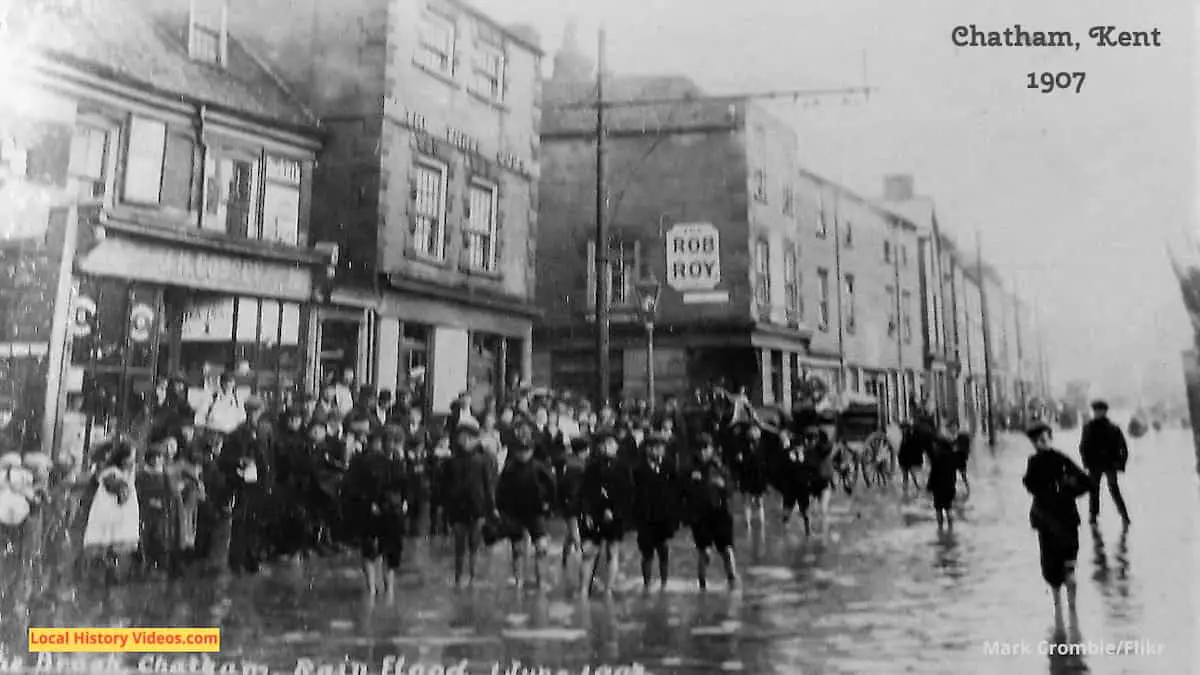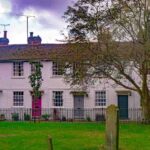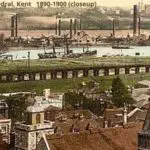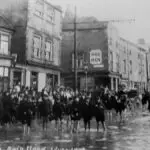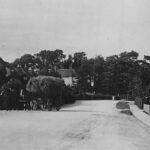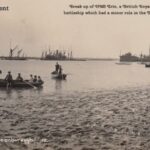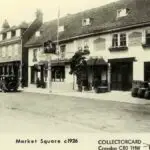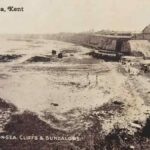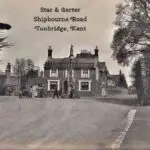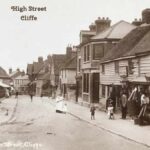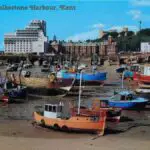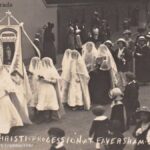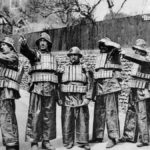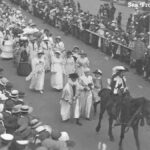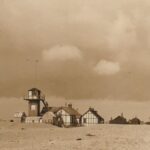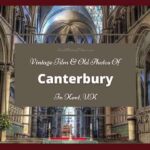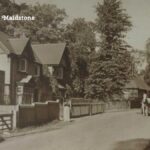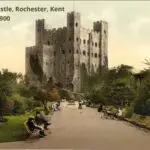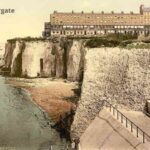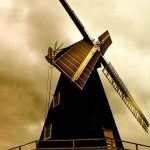Glimpse history through old images of Chatham, Kent, England
Navy Week 1930
A reconstruction of the 1790s Man of War vessel Kent was ready for Chatham’s Navy Week in 1930.
Navy Week at Chatham – British Movietone on YouTube
Chatham in 1977
Silent footage recorded by Thames TV for an episode of ‘A Town Called…’ captures many of the businesses, homes and streets around Chatham in 1977, before taking a look at the dockyard.
The piece shows the juxtaposition of modern, square, often large scale and tall buildings, placed next to the town’s historic properties.
Chatham Dockyard | Kent | A Town Called..| 1977 – ThamesTv on YouTube
Next is the 18 minute video of the completed piece for the programme, which focuses on the Royal Navy’s place in Chatham. The presenter was Monty Modlyn.
1970s Chatham | Royal Navy | Submarines | Military | Kent | A town called…| 1977 – ThamesTv on YouTube
The Chatham Fire of 1820
Extract from “An account of the dreadful fire at Chatham, … the 3rd of March, 1820, etc” by William Jefferys
Published in 1821
Pages 1 – 7
EARLY in the morning of the 3d of March 1820 , a Fire was discovered
in the outbuildings at the back of two houses in the High – street of
Chatham , near the Town Quay , in the occupation of Mr. William Hills a
baker , and Mrs. Jane Burdett a tallow chandler , ( No. 69 and 70 in the
annexed Plan ) which in a few hours consumed thirty – four dwelling houses ,
and materially injured sixteen more ; two others were nearly pulled down ,
to prevent the spreading of the flames , and twelve or thirteen warehouses
or outhouses were either destroyed , or seriously damaged ; an immense
quantity of goods , furniture and other effects , in and about the premises ,
were either entirely consumed or materially injured , and the total loss was
estimated at little less than £ 100,000 .
The greatest part of the property
was insured in the Hope , Kent , Norwich Union , Phoenix , Eagle , Sun , and
West of England Fire Offices ; the Hope , in which the Estates of James
Best , Esq . were insured , sustaining the greatest loss .
The cause in which the fire originated , or the precise spot in
which it began , will always , it is presumed , remain uncertain ; it commenced
either in the bakehouse of Mr. Hills , or in the adjoining melting – house of
Mrs. Burdett , both of which buildings were chiefly composed of timber , and filled with articles of a combustible nature , and workmen had been
employed therein , till late in the evening on the day previous to the accident .
It is imagined , that the strong north – westwardly wind which prevailed the
day before , and which , during the night of the fire , blew a hurricane from
the river Medway ( on the borders of which the Estates were situated ) ,
directly on the buildings that were first discovered to be on fire , enlivened
the ashes thrown from the ovens or furnaces , and by communicating the fire
to the building in which they were deposited , produced the fatal catas
trophe .
Amidst a variety of opinions on the subject , and from the best
information that can be gained , nothing like certainty appears , but the pre
vailing notion , and perhaps the most probable one , is , that the fire began
in the bakehouse of Mr. Hills .
It is very consolatory to infer , when reflecting on this melancholy
occurrence , that the cause of it was accidental , and not the work of an
incendiary ; and that neither a single life was lost on the dreadful occasion ,
nor a person seriously injured in endeavouring to extinguish the flames .
It was a little after two o’clock in the morning when the fire was dis
covered from the river by one Joseph Joyce a waterman , who immediately
rowed his boat on shore at the Town Quay , and gave alarm to the inhabi
tants ; at the same time it was perceived by the sentinel on duty at the
Chatham Barrack Gate , who directly communicated the intelligence to
Lieutenant Larimore , of the First Royal Veteran Battalion , the officer in
command of the guard , who immediately beat to arms , hastened to the town
with a portion of his guard , and roused the occupiers of the houses in the
vicinity of the fire : by these prompt measures the lives of many were
doubtless preserved , as from the dread hour of the night , and the rapidity of
the flames , several might otherwise have fallen a sacrifice to the destructive
element .
The fire in a few minutes making its progress to the front of the High
street , quickly reached the buildings ( No. 19 and 20 ) on the opposite side
of the way , and in the course of half an hour the flames raged with so much
violence as to prevent all near approach to them ; notwithstanding there was presently gathered together a great number of very able , active , and
enterprising men , who nobly exerted themselves in endeavouring to stop the
progress of the flames , and who were well supplied with water from the
river ( it being about the time of high water ) from the adjoining pumps , & c .
the fire , however , bade defiance to all human exertions , and rapidly extending
its destructive powers soon enveloped the whole of the houses , contiguous
to those in which it began , in a general conflagration .
At three o’clock
the scene was terrific in the extreme , and such : was the violence of the
tempest , that the flakes of fire arising from the consuming buildings were
carried by the wind with unparalleled velocity , and of such magnitude ,
as none but an eye witness can credit ; these large flakes communicated the
fire to one hay and two corn stacks standing in the barn yard of Rome
House , belonging to Mr. Best , a distance of four or five hundred yards .
The stacks burnt with incredible fury , and served to distract the attention
of those who were endeavouring to extinguish the burning houses in the
street .
Attempts were made in the first instance to save the stacks , but
they proved ineffectual , for the wind baffled every effort , carried the
embers to Gibraltar Place , and formed a vast current of fire along the
New Road , and even beyond the turnpike gate , a distance of at least a quar
ter of a mile : every building in that direction was in great danger , and it
became necessary to place men on the tops of the houses , buildings , and
stacks , with pails of water , to extinguish the glowing embers as they fell .
During the conflagration of the stacks , a great quantity of water was thrown
from the buckets and fire engines on the adjacent buildings in the barn
yard , which were in imminent danger from their contiguity to the stacks , and
owing to this precaution they were fortunately preserved ; the water cast
on them , from the extreme severity of the cold , froze as it fell , and formed
an icy surface , which deadened the embers , and prevented any farther
damage to the buildings .
About four o’clock the fire appeared at its greatest height ; it had
not only extended to , but had in a great measure destroyed a very large
pile of buildings called the Sun Inn ( No. 44 ) , and the intermediate houses ; so that every hope was now lost of arresting the progress of the all
powerful flames at the Town Quay , which formed an opening or road
from the High – street to the river , between the inn and the adjoining house ,
in the occupation of Mrs. Etherington .
The fire raged with increased
fury , and soon after spreading to the houses in the tenure of Messrs .
Whitehead , Fisher , and Stroughill , and to those on the opposite side of
the street , occupied by Mr. Edward Wickham the Confidential Clerk , and
Mr. Humphry Wickham the Brewer , of Mr. Best , presently communicated
its devouring flames to the elegant and substantial mansion , called Chatham
House , in the occupation of Mr. Best ; in less than two hours the fire had
consumed the interior of that noble edifice , leaving its walls a melancholy
heap of ruins .
The flames , from some apertures in the walls of Chatham
House , then communicated their baneful effects to that part of the adjoining
Brewhouse where the steam engine is erected , and which , amidst the sur
rounding havoc , discharging water at the rate of several tons a minute ,
had yielded an abundant supply to the engines .
At this awful hour ,
it became doubtful to every person who had a house and family in the
town , even at the remotest part of it , whether he should long possess
them : every one partook of the wide – spreading fear , that the next
hour might witness the destruction of all that was most dear and valua
ble to him in life .
The lamentations and cries of those unfortunate
persons who had been so unexpectedly , so suddenly , and so miserably
driven from their homes , in a cold , wintry , and tempestuous night , many
with no more than the scanty apparel they had , in their great fright , hastily
put on , without a home or shelter , to protect them from the ” pelting
pitiless storm , ” were shocking in the extreme : the moving of the furniture
and effects that were happily snatched , at great risk , from the flames , and
carried to the friendly houses of those whose doors were opened to receive
the wretched fugitives and their property ; the piles of furniture made in
the open street , in situations that exposed it almost to as much injury as
it would sustain from the flames ; and the eager enquiries after the safety
and welfare of those who were exposed to the greatest danger , greatly added to the horror which the heart – rending scene presented .
Every one pos
sessed of the common feelings of humanity , was struck with dismay and
despair at the appalling sight , and this terror was rendered more awfully
visible by the prodigious glare of the flames , which illumined the counte
nances of those who were present at the awful scene .
The sparks issuing
from the dreadful crash occasioned by the falling in of the roofs and by the
consuming buildings , rose majestically in a shower of fire to an immense
height in the air , and mixing thickly with the large flakes of snow and hail
that occasionally fell , discoloured , in a remarkable manner , the apparel of
those on whom they alighted ; many persons , and particularly those who
had heroically placed themselves in situations at once difficult and dan
gerous , were ( from their minds being deeply engaged in the awful events ,
in which they were the principal actors ) insensible of the different tem
peratures to which they were exposed ; one moment suffering the effects
arising from the scorching heat , and the next experiencing the intense cold
of a severely freezing atmosphere .
At this critical juncture , a few daring
men , with a courage and intrepidity which will always redound to their
credit , bravely , nay rashly , and at the hazard of their lives , placed them
selves in a dangerous situation between Mr. Best’s house and the adjoining
brewhouse ; the debt of gratitude is justly due to them from the inhabitants
in general , but more particularly from Mr. Best and his friends ; since by their
united exertions , with a plentiful supply of water from buckets , engines ,
& c . and through the merciful interference of a kind Providence , they happily
prevented the flames from spreading in the brewhouse , which was already
on fire in several places .
Their noble exertions were aided by the unusual
thickness and solidity of the walls of Chatham House , which notwithstand
ing the intensity of the heat to which they were exposed ( china , iron ,
silver , & c . melting into one common mass in the interior of the building )
now appeared a ruinous heap indeed , but yet well able to withstand and
form a powerful barrier to the violent impetuosity of the flames , and
the raging tempest by which they were assailed ; from the resistance they
afforded , the contiguous brewhouse , offices , and outbuildings , less solid , yet more extensive , and the valuable property they contained , were rescued
from destruction .
The situation of Chatham House being in the immediate direction of
the wind , and the flames being thereby arrested in their dreadful progress
by its substantial walls , a good opportunity was afforded for many persons
to yield greater assistance in extinguishing the flames in , the houses burn
ing at the other extremity of the fire , and by the great exertions and zealous
endeavours of as brave a set of men as ever contended with so formidable
an assailant , the rapidity of the flames was checked about seven o’clock
in the morning , though it was nine before they were subdued , and noon before
the fire was safely extinguished .
As a proof of the intensity of the heat of
this fire , it is necessary to state , that at the end of five weeks after it hap
pened , some of the timbers on removing the ruins were still burning , and
the coals in the cellars were red with heat .
It would be an invidious task to name those inhabitants who were most
active in endeavouring to extinguish the flames , it is therefore hoped it will be
sufficient to say , that one and all seemed to vie with each other in rendering
their utmost services on the distressing occasion .
It is at the same time pro
per to state that they were well supported by Col. Pasley with the officers
and men of the Sappers ; by Sir Archibald Christie with the officers and men
of the first Veteran Battalion ; by many officers of the Royal Marine Corps
with their men ; by Capt . Parry of the Royal Marine Artillery and his men ;
by Major Hay and Capt . Somerville of the Honourable East India Company’s
service with their men ; and by Brigade Major Holland : many officers of
the Royal Navy with the crews of their respective ships arrived with alacrity
and used their best endeavours not only in preventing the progress of the
flames , but in preserving the property of the unfortunate sufferers by
removing it to places of safety and placing guards to protect it from , the
unhallowed : hands of the pilferers , who then appeared .
The engines of the Dock Yard , Ordnance , and Victualling Office , were
also promptly forwarded by the Commissioner Sir Robert Barlow , Join
Baillie and Henry Stokes , Esqrs . which afforded great assistance .
A painful but necessary task yet remains to be performed , that of
recording the villany of those wretches undeserving the names of men , who ,
during the awful visitation , under the pretence of yielding assistance to their
fellow creatures in the hour of distress , took the base and cowardly advantage
of their sufferings , by pillaging their houses and secretly embezzling their
property .
Several of these unprincipled beings were apprehended and
carried before the Magistrates , who kindly offered their services and
cheerfully gave their attendance and assistance on the melancholy occasion ,
and many were , after a strict examination into their nefarious conduct , com
mitted to prison to answer for crimes for which language has hardly a suitable
epithet ; at the ensuing Assizes sixteen of them were tried , convicted , and
sentenced to various terms of imprisonment ; a few were acquitted , more
from some defect in the evidence than from their own innocence ; and several
escaped the punishment which their infamous conduct justly merited .
To alleviate the pangs of misery and soften the anguish of distress , occa
sioned by this dreadful calamity , a meeting in Vestry of the parishioners was
called on Tuesday the 7th of March , to take into consideration the most
effectual means that could be adopted for the relief of the unfortunate
sufferers .
More about Kent
- Ashford, Kent: History in Old Images
- Old Images of Kent, England
- Old Images of Chatham, Kent
- Old Images of Rolvenden, Kent
- Old Images of Queenborough, Kent
- Old Images of Westerham, Kent
- Old Images of Birchington-on-Sea, Kent
- Old Images of Tonbridge, Kent
- Old Images of Cliffe, Kent
- Old Images of Folkestone, Kent
- Old Images of Faversham, Kent
- Old Images of Broadstairs, Kent
- Old Images of Dover, Kent
- Old Images of Dungeness, Kent
- Canterbury, Kent: History in Old Images
- Old Images of Maidstone, Kent
- Old Images of Rochester, Kent
- Old Images of Margate, Kent
- Kent, A County In England

